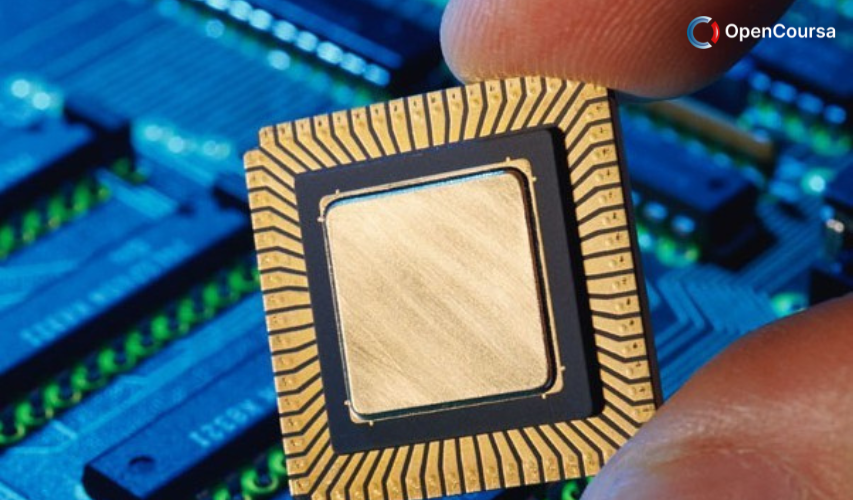Home » Course Layouts » Free Course Layout Udemy
This course will focus on the physics of reliability of small semiconductor devices.
0
1
English
English [CC]
FREE
- Learn basic syntax that can apply to any language.
- Learn what is a programming language and the basic concepts for beginners.
- Understand what is Javascript in it's truest form.
- Know the basic syntax of Javascript.
- Know some hidden quirks in Javascript.
Description
In traditional courses on device physics, the students learn how to compute current through a device when a voltage is applied. However, as transistors are turned on and off trillions of times during the years of the operation, gradually defects accumulate within the device so that at some point the transistor does not work anymore. The course will explore the physics and mathematics regarding how and when things break – a topic of great interest to semiconductor industry.
Course content
- ECE 695A Lecture 1: Reliability of Nanoelectronic Devices Unlimited
- ECE 695A Lecture 2: A Brief History of Reliability and Types of Reliability Models Unlimited
- ECE 695A Lecture 3: Reliability as a Threshold Problem Unlimited
- ECE 695A Lecture 4: Structures and Defects in Crystals Unlimited
- ECE 695A Lecture 5: Amorphous Material/Interfaces Unlimited
- ECE 695A Lecture 6: Defects in the Bulk and at Interfaces Unlimited
- ECE 695A Lecture 7: Trapping in Pre-existing Traps Unlimited
- ECE 695A Lecture 7A: Appendix – Theory of Stochastic Distribution Unlimited
- ECE 695A Lecture 8: Phenomenological Observations for NBTI Unlimited
- ECE 695A Lecture 9: NBTI Time Dependence — Stress Phase Unlimited
- ECE 695A Lecture 10: NBTI Time Dependence — Frequency and Duty Cycle Dependencies Unlimited
- ECE 695A Lecture 10A: Appendix – Reflection on R-D Equation Unlimited
- ECE 695A Lecture 11: Temperature Dependence of NBTI Unlimited
- ECE 695A Lecture 12: Field Dependence of NBTI Unlimited
- ECE 695A Lecture 13: Introductory Lecture on HCI Degradation Unlimited
- ECE 695A Lecture 14a: Voltage Dependent HCI I Unlimited
- ECE 695A Lecture 14b: Voltage Dependent HCI II Unlimited
- ECE 695A Lecture 15: Off-state HCI Degradation Unlimited
- ECE 695A Lecture 16: Temperature Dependence of HCI Unlimited
- ECE 695A Lecture 17: Subthreshold and Idlin Methods Unlimited
- ECE 695A Lecture 18: DC-IV and Charge Pumping Methods Unlimited
- ECE 695A Lecture 19: Spin-Dependent Recombination and Electrically Detected Magnetic Resonance Unlimited
- ECE 695A Lecture 20: Reliability Measurements Unlimited
- ECE 695A Lecture 21: Introduction to Dielectric Breakdown Unlimited
- ECE 695A Lecture 22: Voltage Dependence of Thin Dielectric Breakdown Unlimited
- ECE 695A Lecture 23: Characterization of Defects Responsible for TDDB Unlimited
- ECE 695A Lecture 24: Statistics of Oxide Breakdown – Cell percolation model Unlimited
- ECE 695A Lecture 25: Theory of Soft and Hard Breakdown Unlimited
- ECE 695A Lecture 26-1: Statistics of Soft Breakdown via Methods of Markov Chains Unlimited
- ECE 695A Lecture 26-2: Statistics of Soft Breakdown (Breakdown Position correlation) Unlimited
- ECE 695A Lecture 27: Correlated TDDB in Off-State HCI Unlimited
- ECE 695A Lecture 28: Circuit Implications of Dielectric Breakdown Unlimited
- ECE 695A Lecture 29: Breakdown of Thick Dielectrics Unlimited
- ECE 695A Lecture 29A: Appendix – Dimension of a Surface Unlimited
- ECE 695A Lecture 30: Breakdown in Dielectrics with Defects Unlimited
- ECE 695A Lecture 31: Collecting and Plotting Data Unlimited
- ECE 695A Lecture 31A: Appendix – Bootstrap Method Introduction Unlimited
- ECE 695A Lecture 32: Physical vs. Empirical Distribution Unlimited
- ECE 695A Lecture 33: Model Selection/Goodness of Fit Unlimited
- ECE 695A Lecture 34: Scaling Theory of Design of Experiments Unlimited
- ECE 695A Lecture 34A: Appendix – Variability by Bootstrap Method Unlimited
- ECE 695A Lecture 35: Design of Experiments Unlimited
- ECE 695A Lecture 38: Charge Generation by Particles Unlimited
- ECE 695A Lecture 39-1: Radiation and Devices I Unlimited
- ECE 695A Lecture 40: Failure Analysis and Epilogue Unlimited
N.A
- 5 stars0
- 4 stars0
- 3 stars0
- 2 stars0
- 1 stars0
No Reviews found for this course.
Instructor
OpenCoursa
Accessible Education for Everyone
5
5
6
24772
4637
We are an educational and skills marketplace to accommodate the needs of skills enhancement and free equal education across the globe to the millions. We are bringing courses and trainings every single day for our users. We welcome everyone woth all ages, all background to learn. There is so much available to learn and deliver to the people.
Explore Free Courses
Access valuable knowledge without any cost.
{"title":"","show_title":"0","post_type":"course","taxonomy":"course-cat","term":"engineering-skills,health-and-safety","post_ids":"","course_style":"free","featured_style":"course6","masonry":"","grid_columns":"clear4 col-md-3","column_width":"268","gutter":"30","grid_number":"4","infinite":"","pagination":"","grid_excerpt_length":"20","grid_link":"1","grid_search":"0","course_type":"","css_class":"","container_css":"","custom_css":""}










